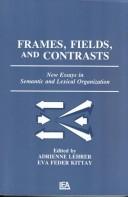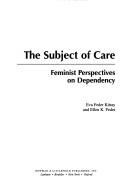| Listing 1 - 10 of 13 | << page >> |
Sort by
|

ISBN: 0415904129 0415904137 9780415904131 Year: 1999 Publisher: New York : Routledge,
Abstract | Keywords | Export | Availability | Bookmark
 Loading...
Loading...Choose an application
- Reference Manager
- EndNote
- RefWorks (Direct export to RefWorks)
This study of women carers explores the significance of dependency work by analyzing John Rawls' influential liberal theory and two examples of public policy - welfare reform and family leave - to show how both theory and policy fail women.
Political philosophy. Social philosophy --- Sociology of the family. Sociology of sexuality --- Caregivers. --- Dependency. --- Equality. --- Women's rights. --- Aidants naturels --- Dépendance (Politique) --- Egalité (Sociologie) --- Femmes --- Droits --- Equal rights amendments. --- Sociale agogiek --- armoedebestrijding en samenlevingsopbouw --- feminisme (feministische visie) --- vrouwen --- féminisme --- femmes --- armoedebestrijding en samenlevingsopbouw. --- Armoedebestrijding en samenlevingsopbouw. --- Dépendance (Politique) --- Egalité (Sociologie) --- Caregivers --- Dependency --- Equality --- Equal rights amendments --- Women's rights --- Rights of women --- Women --- Human rights --- Amendments, Equal rights --- ERAs (Equal rights amendments) --- Constitutional amendments --- Equality before the law --- Sex discrimination against women --- Egalitarianism --- Inequality --- Social equality --- Social inequality --- Political science --- Sociology --- Democracy --- Liberty --- Center-periphery relations --- Core-periphery relations --- Dependent nations --- Colonies --- Imperialism --- Care givers --- Carers --- Family caregivers --- Home health caregivers --- Informal caregivers --- Volunteers --- Civil rights --- Law and legislation --- Legal status, laws, etc.

ISBN: 9780191680472 0191680478 0198242468 0198249357 9780198242468 9780198249351 Year: 1987 Publisher: Oxford: Clarendon,
Abstract | Keywords | Export | Availability | Bookmark
 Loading...
Loading...Choose an application
- Reference Manager
- EndNote
- RefWorks (Direct export to RefWorks)
The purpose of this book is to provide a comprehensive philosophical theory which explains the cognitive contribution of metaphor. The argument is illustrated with analysis of metaphors from literature, philosophy, science, and everyday language.
Metaphor. --- Semantics. --- Field theory (Linguistics) --- Cognition. --- Cognition --- Metaphor --- Semantics --- 82.085.41 --- Formal semantics --- Semasiology --- Semiology (Semantics) --- Comparative linguistics --- Information theory --- Language and languages --- Lexicology --- Meaning (Psychology) --- Parabole --- Figures of speech --- Reification --- Linguistics --- Psychology --- 82.085.41 Literaire metafoor. Beeldspraak --- Literaire metafoor. Beeldspraak --- Métaphore. --- Sémantique. --- Champs (linguistique) --- Theory of knowledge --- Lexicology. Semantics --- Philosophy of language --- Literary rhetorics --- Field theory (Linguistics). --- Métaphore --- Sémantique --- Champ, Théorie du (Linguistique)
Book
ISBN: 9780190844608 9780190844615 9780190844622 9780190844639 Year: 2019 Publisher: New York, N.Y. Oxford University Press
Abstract | Keywords | Export | Availability | Bookmark
 Loading...
Loading...Choose an application
- Reference Manager
- EndNote
- RefWorks (Direct export to RefWorks)
Book
ISBN: 9781138089914 9781138089921 9781315108926 Year: 2020 Publisher: New York, N.Y. Routledge, Taylor & Francis Group
Abstract | Keywords | Export | Availability | Bookmark
 Loading...
Loading...Choose an application
- Reference Manager
- EndNote
- RefWorks (Direct export to RefWorks)
General ethics --- Sociology of the family. Sociology of sexuality --- Sociology of work --- Social policy

ISBN: 0805810897 Year: 1992 Publisher: Hillsdale, N.J. Lawrence Erlbaum
Abstract | Keywords | Export | Availability | Bookmark
 Loading...
Loading...Choose an application
- Reference Manager
- EndNote
- RefWorks (Direct export to RefWorks)
Lexicology. Semantics --- 801.56 --- Syntaxis. Semantiek --- Lexicology. --- Semantics. --- 801.56 Syntaxis. Semantiek --- Lexicology --- Semantics --- Formal semantics --- Semasiology --- Semiology (Semantics) --- Comparative linguistics --- Information theory --- Language and languages --- Meaning (Psychology) --- English language
Book
ISBN: 0847673820 Year: 1989 Publisher: Savage, Md Rowman & Littlefield
Abstract | Keywords | Export | Availability | Bookmark
 Loading...
Loading...Choose an application
- Reference Manager
- EndNote
- RefWorks (Direct export to RefWorks)
Political philosophy. Social philosophy --- General ethics --- Ethics --- Feminist ethics --- Moral development --- Sex differences (Psychology) --- Women --- Congresses. --- Psychology --- Human females --- Wimmin --- Woman --- Womon --- Womyn --- Ethical development --- Congresses --- Psychology&delete& --- Females --- Human beings --- Femininity --- Child psychology --- Moral education --- Faith development --- Feminism --- Moral and ethical aspects

ISBN: 9780631224273 0631224270 9780631224280 0631224289 Year: 2007 Publisher: Malden, Mass. Blackwell
Abstract | Keywords | Export | Availability | Bookmark
 Loading...
Loading...Choose an application
- Reference Manager
- EndNote
- RefWorks (Direct export to RefWorks)
Feminist theory. --- Women philosophers. --- Gournay, de, Marie le Jars --- Political philosophy. Social philosophy --- Feminist theory --- Women philosophers --- Women as philosophers --- Philosophers --- Women scholars --- Feminism --- Feminist philosophy --- Feminist sociology --- Theory of feminism --- Philosophy --- Aesthetics --- Ethics --- Disability --- History --- Colonialism --- Female homosexuality --- Politics --- Theory --- Science --- Book --- Third feminist wave --- Epistemology

ISBN: 0742513637 0742513629 9780742513631 9780742513624 Year: 2003 Publisher: Lanham: Rowman & Littlefield,
Abstract | Keywords | Export | Availability | Bookmark
 Loading...
Loading...Choose an application
- Reference Manager
- EndNote
- RefWorks (Direct export to RefWorks)
#SBIB:316.334.3M40 --- #SBIB:316.346H20 --- Medische sociologie: zorgenverstrekkers, relatie met hulpvragers --- Positie van de vrouw in de samenleving: algemeen --- Sociology of social care --- Sociology of social welfare --- United States --- Feminism --- Child welfare --- Mother and child --- Caregivers --- Family services --- Family relationships --- Emancipation of women --- Feminist movement --- Women --- Women's lib --- Women's liberation --- Women's liberation movement --- Women's movement --- Emancipation --- Social movements --- Anti-feminism --- Child welfare - United States --- Mother and child - United States --- Caregivers - Family relationships --- Family services - United States --- United States of America --- Social security --- Care --- Book --- Edited volume --- Dependence
Book
Year: 1978
Abstract | Keywords | Export | Availability | Bookmark
 Loading...
Loading...Choose an application
- Reference Manager
- EndNote
- RefWorks (Direct export to RefWorks)
Book

ISBN: 0231544634 0231182988 Year: 2018 Publisher: New York, NY : Columbia University Press,
Abstract | Keywords | Export | Availability | Bookmark
 Loading...
Loading...Choose an application
- Reference Manager
- EndNote
- RefWorks (Direct export to RefWorks)
The idea that the self is inextricably intertwined with the rest of the world-the "oneness hypothesis"-can be found in many of the world's philosophical and religious traditions. Oneness provides ways to imagine and achieve a more expansive conception of the self as fundamentally connected with other people, creatures, and things. Such views present profound challenges to Western hyperindividualism and its excessive concern with self-interest and tendency toward self-centered behavior.This anthology presents a wide-ranging, interdisciplinary exploration of the nature and implications of the oneness hypothesis. While fundamentally inspired by East and South Asian traditions, in which such a view is often critical to their philosophical approach, this collection also draws upon religious studies, psychology, and Western philosophy, as well as sociology, evolutionary theory, and cognitive neuroscience. Contributors trace the oneness hypothesis through the works of East Asian and Western schools, including Confucianism, Mohism, Daoism, Buddhism, and Platonism and such thinkers as Zhuangzi, Kant, James, and Dewey. They intervene in debates over ethics, cultural difference, identity, group solidarity, and the positive and negative implications of metaphors of organic unity. Challenging dominant views that presume that the proper scope of the mind stops at the boundaries of skin and skull, The Oneness Hypothesis shows that a more relational conception of the self is not only consistent with contemporary science but has the potential to lead to greater happiness and well-being for both individuals and the larger wholes of which they are parts.
Whole and parts (Philosophy) --- Concord. --- Monism. --- Self (Philosophy) --- Other (Philosophy) --- Philosophy. --- Religion.
| Listing 1 - 10 of 13 | << page >> |
Sort by
|

 Search
Search Feedback
Feedback About UniCat
About UniCat  Help
Help News
News